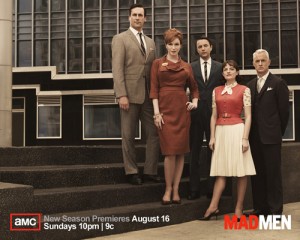The AMC period drama Mad Men created by Matthew Weiner is based in the 1960’s and explores the discourse of the time while tackling concepts of gender, race, politics, consumerism and popular culture. The program follows the troubled life of the advertising worlds ‘top dog’ Donald Draper (Jon Hamm) and his attempts to balance work, family and women. As it is set in the past it is questionable whether the show accurately reflects the time or merely attempts to reimagine it.
In the late 1980’s AMC was considered to be one of leading brands for cable television yet now it’s quite the opposite. (Jaramillo, D. 2012). Their original purpose was to air classic films, thus the name, American Movie Classics but this focus in programs shifted, and their branding became less focused. Through their attempts to find their ground they begun a new approach in original scripted series such as Breaking Bad and Mad Men. Though today, AMC could be said to be a bit behind the times. compared to other networks such as HBO, they have been able to execute various successful programs with Mad Men being the focus of discussion.
During our lecture we were posed a question of whether Mad Men ideologically reassures us of the struggles of that time (particularly gender and race) have led to a more equitable present? I would have to agree that it has.
The 60’s was a time of rapid change, a time where racism and sexism was at its prime, and this is clear through the discriminatory dialogue toward other races and more prominently its undermining representation of women. Times have changed and there has been significant progress with less racism and sexism. This is clear through the equal rights movement that has been attained in most countries today.
This is why Jason Mittel accurately describes (in his blog ‘On Disliking Mad Men’) us viewing the characters as ‘dinosaurs unaware of the coming ice age’. Though he sheds negative light on the program he fairly analyses it as ‘just blowing smoke’.
Mad Men’s approach of nostalgia seems only to fool the younger generations who merely imagined the 60’s (including me). Behind the saturated mise en scene, the retro fashion, set designs, and smoke are we just left with a shiny reconstruction of the past? The idealistic aspects of the 60’s advertising world including its hyper sexuality, success and social lives are heightened to add to this notion. It could very well be seen as an attempt to pigeonhole the 60’s into a very specific demographic of a hyper reality.
Beyond its generalisation of the time Mad Men is said to misrepresent the it through the representation of 9/11 and the Kennedy assassination. It misrepresented the mediated experience by almost completely ignoring radio as the main form of representation. (Donnar. G. 2015).
I have to agree that as a historical text Mad Men has poorly represented the time. This is because we are ignoring the fact that it is a television program. Once we stop looking at Mad Men as a historical document and more as a comment on a ‘wider sense of history’ a comment on time rather than on the decade, as suggested by Stoddart in his book Analysing Mad Men, it begins to make more sense. It allows for reflection on how far we have come, although not perfect there has been change. Mad Men is set in the 60’s but talks directly to audiences today.
It would be wrong to expect Mad Men as a television series to represent that time with complete accuracy. Aspects of the 60’s aren’t exclusive to those dates and therefore forces the program to recreate or reimagine the 60’s in a way that talks not only as a reflection of the past but as a comment on today.
References
Stoddart, S. (2011). Analyzing Mad Men. Jefferson, N.C.: McFarland & Company. Pp.115-59
Glen Donnar (forthcoming, 2015), “A Less Than Nostalgic Reflection on 9/11: Mad Men’s Re-imagining of the Mediated Experience of the Kennedy Assassination”, in A Keeble, V Bryan and H Pope (eds.), Reflecting 9/11: New Narratives of Crisis, Disaster and Change, Cambridge Scholars Publishing, Cambridge
Mittel, J. (2010). On Disliking Mad Men. [Blog] random thoughts from media scholar jason mittell. Available at: https://justtv.wordpress.com/2010/07/29/on-disliking-mad-men/ [Accessed 11 Oct. 2015].
Jaramillo, D. (2012). AMC: Stumbling toward a New Television Canon. Television & New Media, 14(2), pp.167-183.

